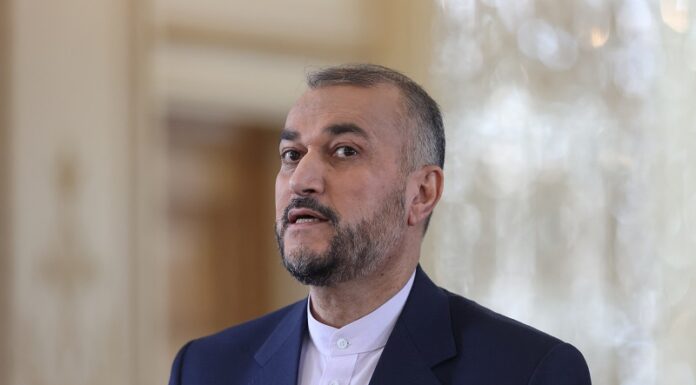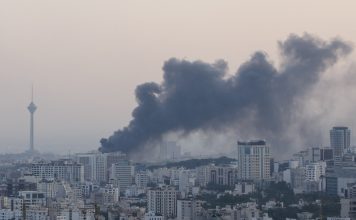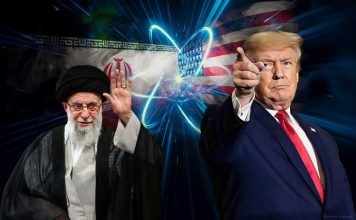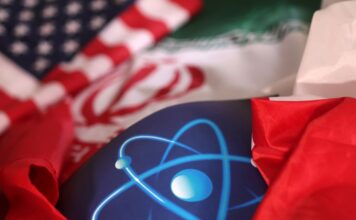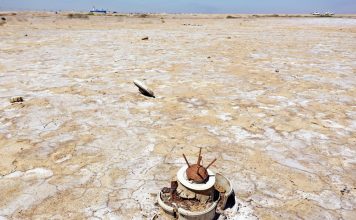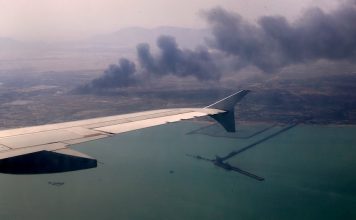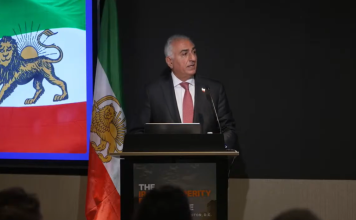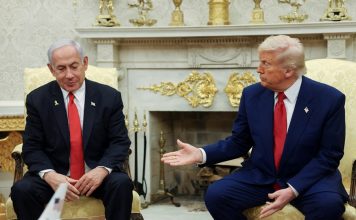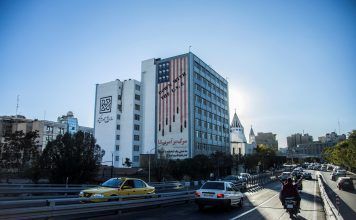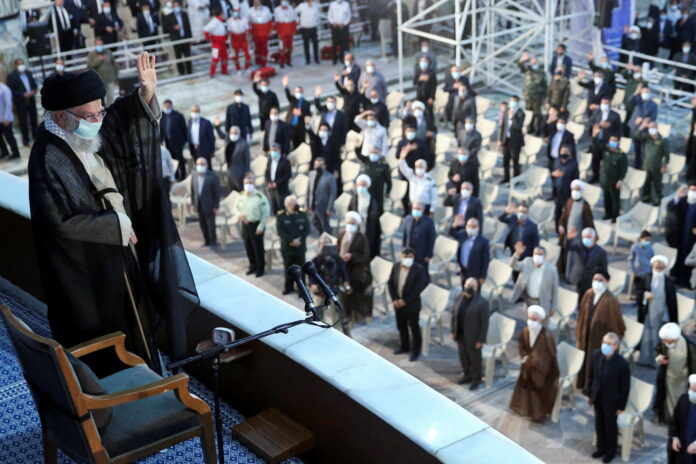
Iranian Foreign Minister Hossein Amir-Abdollahian met the Vatican’s Cardinal Secretary of State, Pietro Parolin, and Secretary for Relations with State, Archbishop Paul Richard Gallagher, in Vatican City on July 13.
Mr. Abdollahian assured the representatives of the Holy See that Iran was “serious about achieving a good and lasting agreement on lifting all sanctions in the [Vienna nuclear] talks.”
“We have been creative and showed significant flexibilities, but the U.S. must be realistic in setting conditions for achieving a final agreement,” the Islamic Republic News Agency (IRNA) quoted Abdollahian saying.
Abdollahian’s apparently softer stance in the Vienna nuclear talks – which would have had to be approved by Iran’s Supreme Leader Ayatollah Ali Khamenei — shows that Iran understands the need for striking a deal with the U.S.
Despite Foreign Minister Abdollahian’s “significant flexibilities” remarks, Iran has refused to compromise on two of its key demands: a guarantee that a future American president will not withdraw from the agreement, and that the U.S. will remove the Islamic Revolutionary Guards Corps (IRGC) from its Foreign Terrorist Organization (FTO) list.
The suggestion that to strike a new nuclear deal with the West, Iran might deviate from the hardline foreign policy of “Revolutionary Government,” promoted by the late Lieutenant General Ghasem Soleimani, has alarmed ultraconservative lawmakers in the Majlis (Iranian Parliament), who, at least on two occasions, have warned President Ebrahim Raisi “not to cross the Islamic Republic’s red line.”
Lieutenant General Ghasem Soleimani, the commander of the IRGC’s Qods Force (IRGC-QF), died in a U.S. drone attack on Baghdad International Airport on Jan. 3, 2020. The QF is the IRGC’s special branch conducting extraterritorial operations.
Foreign Minister Abdollahian’s “significant flexibilities” comment contradicted assertions by his deputy Ali Bagheri-Kani, the lead negotiator in the Vienna talks, who said that the Islamic Republic had pushed back against the “enemy’s unreasonable demands” during the “diplomatic resistance.”
Some people inside Iran and their affiliates working as mediators in think tanks and research centers in the U.S. and Europe believe that negotiating with America would be in Iran’s interest and, therefore, view Mr. Bagheri-Kani as a deal-breaker.
They argue that despite being the lead negotiator at the Vienna nuclear talks, Bagheri-Kani “does not believe” in the 2015 Joint Comprehensive Plan of Action (JCPOA) and have called for him to be replaced. However, they must know that both Abdollahian and Bagheri-Kani take their cues from Mr. Khamenei and his inner circle.
After just a few hours of talks in Doha, the capital of Qatar, on July 5, Robert Malley, the U.S. Special Representative for Iran and the lead negotiator in the Vienna talks, said: “Iran must first negotiate with itself.”
In an interview with the U.S.-based National Public Radio (NPR) on the same day, Mr. Malley explained: “The European Union, in its role as coordinator, wanted to try one more effort, so they invited both delegations to meet with them in Doha hoping that the Iranians would show something, some willingness to get to yes.”
“But they seemed not capable of providing an answer. And so, it was a bit of a, well, more than a little of a wasted occasion, I’d say,” Mr. Malley added.
The Doha talks were held with a new format of 2+1 (U.S., Iran, and Qatar as a facilitator/mediator).
A day later, Qatari Foreign Minister Mohammed bin Abdulrahman Al Thani traveled to Tehran to talk with senior Iranian officials. Upon returning to Doha, he said there were “no signs of a breakthrough in the negotiations.”
Deputy Foreign Minister Bagheri-Kani was Iran’s lead negotiator at the Doha meeting. Whether Bagheri-Kani is against reviving the JCPOA or the talks, he cannot make any move without the approval of the Iranian leadership.
A tweet by Kayhan London on July 5 said: “Pressure to change the Islamic Republic’s nuclear negotiating team has increased inside the country.”
The Tehran-based Jomhuri-e Eslami newspaper argued that “the correct course of action would be the nuclear-negotiating team to believe in the JCPOA’s basic principles.”
Like other state organs, the Iranian Foreign Ministry has adopted a two-pronged policy. While Minister Abdollahian speaks of “cooperation and flexibility” in meetings with foreign dignitaries, his deputy and lead nuclear negotiator, Bagheri-Kani, sabotages negotiations through his “diplomatic resistance” tactic.
Deep divisions exist among the Islamic Republic’s senior leadership on handling the West, with each faction looking after its own interests. Khamenei is the architect of this contradictory approach, given that he has repeatedly said that the Foreign Ministry’s job was to carry out policies set by the state.
It is worth analyzing this tactic.
While the first group believes that “any agreement is better than no agreement,” the second group argues that “no agreement is preferable to any harm caused by [repeating the JCPOA].” Meanwhile, the third group opposes any agreement with the West, especially the U.S. They believe that any agreement with the West would threaten Islamic Republic rule, arguing that only “resistance” can protect the regime’s interests.
After the U.S. unilaterally withdrew from the JCPOA in May 2018, Khamenei set seven conditions for Europe before Iran would return to the negotiations, none of which were met. Khamenei warned, “if the West tears up the agreement, we will set fire to it.”
Yet Khamenei has ignored his own conditions and tried to keep the nuclear deal alive in the past few years.
That Khamenei has not “set fire” to the JCPOA and instead given the green light to senior diplomats to engage in negotiations with the West — even after the death of General Soleimani, who was a staunch opponent of the nuclear deal — shows that he knows that abandoning the agreement will have severe consequences for the Islamic Republic.
Despite Iran’s refusal to comply with JCPOA articles in the past few years, and growing opposition to the agreement among powerful factions in Iran, who argue that it will not benefit the country, Khamenei continues to engage with the West because he believes that the alternative would pose a serious threat to the regime.
While some regime insiders believe that “the U.S. will make compromises if Iran were to show some flexibilities,” others argue that to strike a deal, “the U.S. must remove the IRGC from its FTO list, close the file on the Possible Military Dimensions (PMD) of Iran’s nuclear program, and lift all sanctions imposed because of the country’s nuclear activities and human rights record.”
Both groups claim to protect the Islamic Republic’s interests. However, these are two distinctly different tactics.
For instance, Ali Akbar Salehi, former Iranian Foreign Minister (in office from 2011 to 2013) and head of the Atomic Energy Organization of Iran (AEOI, from 2009 to 2010 and again from 2013 to 2021), believes rebooting the JCPOA would be in Iran’s interest.
“I hope the JCPOA is revived,” the Isfahan-based Isal news agency reported on July 5, quoting Mr. Salehi. “If God forbid, we hesitate in this regard; we will be tied in a knot that only God can cut open. The nation will have to endure unbearable hardship again.”
In contrast, General Ghasem Soleimani and the late Mohsen Fakhrizadeh were staunch opponents of the JCPOA. They argued that the U.S. would not be satisfied with the JCPOA and would push for a deal on Iran’s missile program and human rights because “the U.S. will never abandon its wolf-like nature.”
General Ghasem Soleimani described the JCPOA as a “three-sided” deal that included Iran’s nuclear, missile, and regional activities.
“JCPOA 2 and 3 aim to halt the spread of pure Islam in the region,” General Soleimani famously said.
On Nov. 27, 2020, unknown attackers killed Mohsen Fakhrizadeh, dubbed the “father of Iran’s nuclear program,” reportedly using a “remote control weapon” to fire on his car in Mostafa Khomeini Boulevard in Absard, 80 kilometers east of Tehran. Many believe that Israel was behind the assassination.
There is still a faction in Iran that believes developing a “nuclear bomb” guarantees the Islamic Republic’s survival. They argue that having nuclear weapons will halt Israeli threats. Mohsen Fakhrizadeh thought nuclear weapons were necessary for protecting the Islamic Republic and Iran-backed militia groups operating in the region.
There is deep division among senior IRGC commanders on whether to negotiate or oppose the U.S. at all costs. It is hard to know whether Khamenei still supports the development of Iran’s ballistic missile program and continued support for the militia groups in the region, given the current climate, or he does IRGC’s bidding, or he is a puppet of foreign governments which pull his strings.
The IRGC protects Iran against foreign threats and crushes protests inside Iran. Without the IRGC’s support, the regime and its leader would not last long. However, The Islamic Republic’s intelligence and security agencies, including the IRGC, have been infiltrated at the highest levels.
There are rumors about Khamenei being concerned and confused about Iran’s current state. Mr. Khamenei, who is 83 years old, is concerned about his legacy. It is not farfetched to think that he bends to the will of people around him, without whom he and the regime would not survive.
One day soon, Khamenei may confess to having far less authority than everyone thought he had, and that he shares power with those whose interests he protects.
Evidence suggests that neither Khamenei nor the IRGC run the country and that both get their orders from sources outside Iran.
The Vienna nuclear talks had reached a deadlock before Russia’s military invasion of Ukraine. After the start of the conflict, Moscow tried to blackmail the U.S. and the EU by threatening to derail the Vienna talks if they did not lift economic sanctions.
In February, Britain, France, and Germany (three signatories to the JCPOA) urged Russia not to exacerbate the nuclear crisis by setting conditions for reviving the JCPOA. The U.S. threatened to “move forward without Russia if it did not back down.”
Russian President Vladimir Putin has used Iran in its game against the West. He has prevented the talks from yielding concrete results. Russia’s derailment of the nuclear negotiation resulted from Mr. Putin’s veto power and his vast influence on the Islamic Republic’s political, intelligence and security leadership.
Kremlin reportedly forwards Putin’s orders to the senior decision-makers in Iran. That is why Bagheri-Kani flew to Moscow immediately after the Doha meeting earlier this month instead of returning to Tehran right away.
To compensate for his defeat in Ukraine, Putin may open a new front against the West. It makes no difference to Putin if Iran or Syria pays a heavy price for his failed policies.
During a White House briefing on July 11, U.S. National Security Advisor, Jake Sullivan, said Iran was preparing to supply Russia with unmanned aerial vehicles (UAVs.)
“Our information indicates that the Iranian government is preparing to provide Russia with up to several hundred UAVs, including weapons-capable UAVs, on an expedited timeline,” Mr. Sullivan told reporters in the White House briefing room.
Sullivan’s announcement coincided with U.S. President Joe Biden’s official visits to Israel, Saudi Arabia, and Palestine in the past few days.
Supplying hundreds of drones, including weapons-capable UAVs, to Russia will involve Iran in the war with Ukraine. Russia also used Iran as its lackey in the Syrian conflict.
In an interview with Iranian state TV in 2019, Ali Akbar Velayati, a senior advisor to Khamenei on foreign policy matters, noted that “the nuclear agreement was a state affair and not an individual decision.” Mr. Velayati admitted that “failure to have signed the agreement in 2015 would have led to war.”
It is noteworthy that Iran had not lost all its credibility in 2015, and the international community was not facing multiple crises as it has in recent years. The Islamic Republic still had some tools in its negotiation box.
Although Biden’s administration has followed former President Barack Obama’s roadmap to strike a deal, failed negotiations in the past two years have made the U.S. lose hope of “reviving the JCPOA.”
In an opinion piece published in Project Syndicate (The World Opinion Page) on July 14, Josep Borrell, the High Representative of the European Union for Foreign Affairs and Security Policy, said: “Today, the JCPOA is under great pressure on multiple fronts. I am convinced that action to preserve it is not just necessary but urgent.”
“If the JCPOA is lost, no other comprehensive or effective alternative will wait around the corner,” Mr. Borrell warned.
President Putin has already dragged the Head of the Chechen Republic, Ramzan Kadyrov, and the President of Belarus, Alexander Lukashenko, into the war in Ukraine, and now he wants to get Khamenei and Iran involved in the conflict.
The U.S. has highlighted the supply of Iranian-made drones to Russia at an extremely sensitive juncture.

